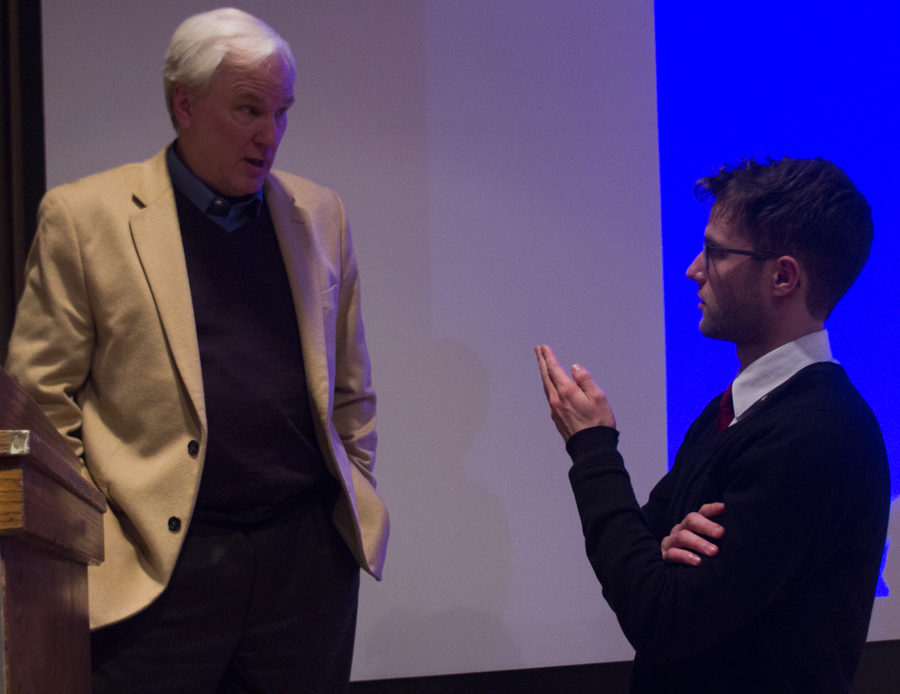AIDS awareness week kicked off by lecture talking about economic side
Yanhua Huang/ Iowa State Daily
Sean Lundy, right, senior in global resource systems, asks Mead Over questions about international funding operations details. Over gave a lecture about funding operation effects on the fight against AIDS, at 8 p.m. Tuesday, Dec. 3, in the Sun Room of the Memorial Union.
December 4, 2013
Over the years, society has achieved major success in the fight against AIDS, but there is still a lot to be done, said Mead Over, senior fellow at the Center for Global Development and former World Bank economist.
Over kicked off this year’s world AIDS awareness week with his lecture, “The Global Struggle against AIDS — The U.S. Role & Prospects for Sustainability.”
Over said his economics background allows him to share a different experience on how to fight the disease and to improve matters significantly.
“We spend a large amount of money on fighting AIDS, and we’ve come pretty far already,” Over said. “But the billions of dollars could be spent more effectively.”
The major issue with AIDS, as of now, can be compared to the birth and death rate development, Over said.
“In the pre-industrial stage of history, birth and death rates both were very high. But once the industrialization kicked in, the death rate began to decline. On paper that sounds really great, but it also leads to another problem,” Over said.
Since the birth rates remained high, people started to worry about the vast population growth, especially in the developing countries.
“What really helped the issue was the birth rate to fall down as well, so that the rate could level off and stabilize,” Over said.
Due to better treatment, the number of AIDS deaths have been falling since 2003, yet the annual number of new infections is barely declining.
“The result is that the yearly addition to HIV positives is growing and growing,” Over said.
On the one hand, that is good news, Over said, because that means people who would have died otherwise have survived due to better medical treatment.
“On the other hand, though, the problem gets worse, because more people get infected with HIV,” Over said. “Also, people are depended on donors for that one pill a day that keeps them alive for another day.”
Over said that to accomplish an AIDS transition, governments must not only keep the AIDS mortality low but also greatly decrease rates of new infections.
“There are various ways of accomplishing that goal,” Over said. “One would be to spend donations more effectively.”
For that, donors would need to make a multi-year commitment with the recipients, allowing them to define specified terms to raise the efficiency, Over said.
A far better solution would be the concept of Cash on Delivery, a term formerly used in traditional post offices, where people would pay for their mail once they received it.
“It’s quite simple. A certain amount of money, let’s say $100, would be given to the governments for each averted case of HIV, which in our modern times can be achieved in multiple ways,” Over said.
He said programs like this must not replace current aid programs: “I’d rather see them as a bonus, a complementary addition.”
That way, countries would be rewarded for improvements, giving them an added incentive to work on the best possible solutions.
“HIV infections would be averted from scratch, thus overall reducing the number of AIDS victims significantly,” Over said.
“I thought the lecture was very informative and opened up some new ideas,” said Rebecca Clay, junior in agronomy. “I’m not an expert on economics, though, so I had troubles understanding some of the points Mead Over was making.”
Nick Jackosky, sophomore in global resource systems, said the topic hit home to him. He had a teacher whose brother had HIV.
Jackosky said he doesn’t know how one could look at someone, who has that disease and not feel compassion for this person. “That’s why I visit lectures like this — to learn how to fight this problem.”

















